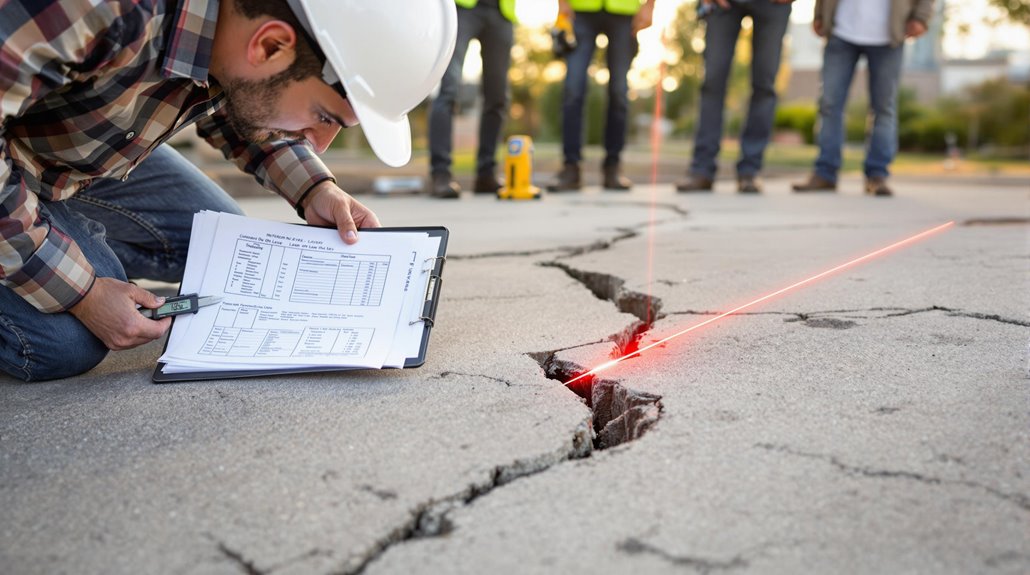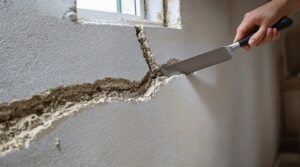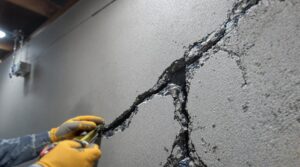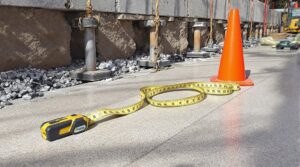Hiring a qualified foundation repair contractor requires careful evaluation of key factors. Important qualifications and licenses, such as contractor licensing and insurance coverage, must be verified. Experience and specialization in foundation repair, as well as transparent estimates, are essential. Effective project management and a strong reputation backed by thorough warranties and aftercare are also important. By understanding these factors, homeowners can make informed decisions and gain confidence in their chosen contractor, leading to a successful foundation repair project.
Key Takeaways
- Verify a contractor's license, insurance, and credentials through the state's licensing board to ensure qualifications and expertise.
- Check for extensive experience and specialization in foundation repair, including knowledge of local building codes and various foundation types.
- Obtain and compare detailed estimates from at least three contractors, including a cost breakdown and scope of work.
- Evaluate a contractor's project management and communication strategies, including scheduling, updates, and risk assessment.
- Assess a contractor's reputation, warranty, and aftercare, including online reviews, professional associations, and transferable warranties.
Essential Qualifications and Licenses
Contractor licensing is a vital aspect of the hiring process for foundation repair projects, as it verifies a contractor's qualifications and expertise in the field.
When searching for a qualified foundation repair contractor, license verification is necessary to ascertain the contractor has the necessary credentials. Different states offer various license classifications, such as residential and commercial licenses.
Additionally, insurance coverage, including general liability and workers' compensation, is important to protect homeowners and contractors from potential liabilities.
To confirm a contractor's licensure and insurance status, homeowners can check with their state's licensing board or request proof of insurance from the contractor.
Hiring an unlicensed contractor can result in liability falling on the homeowner for worker injuries and other potential issues that may arise during the project.
This step helps guarantee the contractor's credibility and professionalism, providing homeowners with assurance that their foundation repair project is in capable hands.
Experience and Specialization in Foundation Repair
Once a foundation repair contractor's licenses and insurance have been verified, homeowners must consider the contractor's level of experience and specialization in the field.
A foundation repair contractor with extensive knowledge and years of on-the-job training is essential for effective repair. Specialization in various foundation types, such as slab or pier and beam, is vital for addressing specific problem areas.
The contractor should also possess expertise in foundation repair techniques, including dealing with expansive clay soil and understanding local building codes and regulations.
A contractor with specialized knowledge of repair techniques and products can provide solutions geared toward different foundation problems. It is also beneficial for homeowners to engage foundation contractors early in the construction process to prevent future structural issues.
Homeowners should look for contractors who can provide evidence of past work and references from similar projects, demonstrating their expertise in foundation repair.
Obtaining and Comparing Estimates

When evaluating potential foundation repair contractors, obtaining and comparing estimates is an essential step in the hiring process.
To guarantee estimate accuracy, a professional inspection of the property is necessary, typically costing between $300 and $500. A thorough review of the property, including visual inspection and measurement, should be the basis for the estimate.
The estimate should include a detailed cost breakdown, outlining material and labor costs, as well as any additional expenses. Comparing estimates from at least three contractors allows homeowners to assess average costs, which range from $2,218 to $8,110, with labor costs averaging around $200 per hour. Transparency and clarity are provided when the estimate includes a detailed scope of work.
Evaluating Project Management and Communication
Effective project management and communication are essential components of a successful foundation repair project. A well-managed project guarantees that the repair work is completed on time, within budget, and to the client's satisfaction. To evaluate a contractor's project management and communication skills, consider the following key factors:
| Project Management | Communication Strategies |
|---|---|
| Clear scheduling and real-time updates | Professional and transparent communication |
| Regular project tracking and client accessibility | Regular client feedback and automated communication |
| Integrated project management software | Access to project information and customized solutions |
| Risk assessment and contingency planning | Liability coverage and transparency on delays |
Assessing Reputation, Warranties, and Aftercare

Reputation, warranties, and aftercare are important aspects to take into account when hiring a foundation repair contractor. A contractor's reputation can be assessed through their track record, online reviews, professional associations, licensing, and insurance. Homeowners should verify membership in organizations such as the National Association of Waterproofing and Structural Repair Contractors and the Better Business Bureau.
In addition to contractor reputation, warranty evaluation is necessary. Homeowners should check the warranty duration, limits, and provisions for third-party arbitration. A thorough warranty should also be transferable and include a clear outline of warranty fees.
Effective aftercare is also significant, and homeowners should understand the possibility of residual damage and the importance of post-repair checklists, work order review, and foundation maintenance.
Frequently Asked Questions
What Are the Immediate Signs That a House Needs Foundation Repair Work?
Alarmingly, a house can literally crumble beneath one's feet, requiring swift foundation repair if telling signs are ignored. Uneven floors and cracked walls are glaring indicators, while persistently sticking doors and windows signal impending catastrophic damage.
Can Homeowners Stay in the House During Foundation Repair Work?
Homeowners can often stay in the house during foundation repair work, but in some cases, temporary relocation may be necessary due to safety considerations, such as excavation, utility disconnections, or elevation requirements. Extensive damage may also require relocation.
How Long Does a Typical Foundation Repair Project Take to Complete?
A typical foundation repair project is a monumental undertaking, sprawling across an eternity of 1 to 4 days for minor to moderate repairs, with complex repairs devouring 1 to 3 weeks of the foundation repair timeline, influencing project duration.
Are Foundation Repair Costs Covered by Homeowner's Insurance Policies?
Foundation repair costs may be covered by homeowner's insurance policies, but coverage depends on the cause of damage and policy specifics, including coverage limits. Damage from certain events, like floods and earthquakes, requires separate policies.
What Are the Most Common Causes of Foundation Damage to Houses?
Foundation damage to houses is commonly caused by improper water drainage, leading to soil erosion and water pooling, as well as soil-related issues such as expansion and contraction, and construction errors including poor soil preparation.








